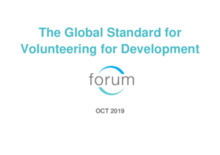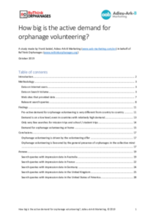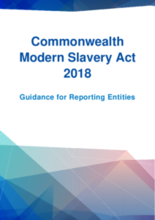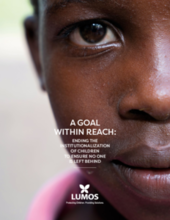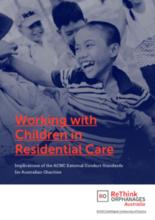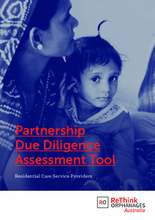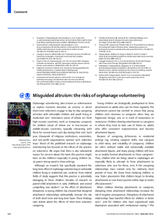<< Back to ReThink Orphanages Home

Resources for Divestment
 Orphanage Divestment Resource
Orphanage Divestment Resource
Orphanage divestment resources for the travel and volunteering sectors
 Divesting of Residential Care Services: Guidelines for Donors
Divesting of Residential Care Services: Guidelines for Donors
These guidelines have been written to guide donors and partners through the process of gathering information, making the decision to divest, securing buy-in internally for divestment, engaging with your partner and other stakeholders, developing your divestment plan, communicating your plan, and addressing any child safety concerns.
Resources for Schools and University Groups
The following resources have been developed by members of the ReThink Orphanages coalition in order to support schools and universities to strengthen their work around overseas student volunteering and travel.
Australia
![]() Curriculum resource - aimed at 15 - 18 year olds, have been designed to support educators in teaching about the complex issue of institutionalisation and orphanage tourism in the classroom.
Curriculum resource - aimed at 15 - 18 year olds, have been designed to support educators in teaching about the complex issue of institutionalisation and orphanage tourism in the classroom.
![]() Self Assessment Tool - Developed by our partner organisations in Australia - Save the Children Australia, World Challenge and ALTO - this self assessment tool has been designed to help schools and universities undertake their own due diligence on their service learning, volunteering and community engagement activities overseas. The tool will help with risk assessment and management of overseas trips and is user friendly, with clear guidance and best practice examples.
Self Assessment Tool - Developed by our partner organisations in Australia - Save the Children Australia, World Challenge and ALTO - this self assessment tool has been designed to help schools and universities undertake their own due diligence on their service learning, volunteering and community engagement activities overseas. The tool will help with risk assessment and management of overseas trips and is user friendly, with clear guidance and best practice examples.
USA
Teaching resources - designed by and for US educators to navigate the complexities of ethical global volunteer practices, including engagement with orphanages and residential care institutions. These resources provide a way to introduce students to: ethical and responsible community engagement and issues of orphanage tourism and voluntourism. The resources are aimed for high school students and can be modified for middle school:
![]() Designing an ethical global service learning program
Designing an ethical global service learning program
Unpacking global poverty through service learning
UK
![]() England curriculum resource - these resources have been developed to support English schools to navigate the complexities of engagement with orphanages and residential care institutions overseas as part of a Gap Year project or an overseas expedition. They are designed to provide an overview of the issues of orphans and vulnerable children, orphanage tourism and ‘voluntourism’, and ethical and responsible community engagement. The resources are aimed at KS4 and KS5 and have been designed to align with the English curriculum - specifically the SMSC and PSHE criteria.
England curriculum resource - these resources have been developed to support English schools to navigate the complexities of engagement with orphanages and residential care institutions overseas as part of a Gap Year project or an overseas expedition. They are designed to provide an overview of the issues of orphans and vulnerable children, orphanage tourism and ‘voluntourism’, and ethical and responsible community engagement. The resources are aimed at KS4 and KS5 and have been designed to align with the English curriculum - specifically the SMSC and PSHE criteria.
The University Pledge
Several universities in Europe have pledged not to support orphanage volunteering by committing to not allow the promotion of such opportunities to their students.
If your school, college or university currently supports an orphanage overseas we can help to review this to ensure that efforts are directed towards programs that will help families stay together.
Resources for Gap Year and Study Abroad Students
Learning Through Volunteering
![]() Our friends over at Learning Service have written a brilliant book called Learning Service: The Essential Guide to Volunteering Abroad, which we would highly recommend you read should you be considering participating in a voluntary experience whilst studying abroad. They also give some fantastic advice on how to increase your learning whilst travelling.
Our friends over at Learning Service have written a brilliant book called Learning Service: The Essential Guide to Volunteering Abroad, which we would highly recommend you read should you be considering participating in a voluntary experience whilst studying abroad. They also give some fantastic advice on how to increase your learning whilst travelling.
Resources for Churches and Short-Term Mission Teams
![]() If you’re planning a short-term mission trip you’re in luck! Our faith-based partner organisations have developed some excellent guidance documents and resources to support you in understanding how to avoid any potential harm and instead ensure positive outcomes for vulnerable children, their families and their communities.
If you’re planning a short-term mission trip you’re in luck! Our faith-based partner organisations have developed some excellent guidance documents and resources to support you in understanding how to avoid any potential harm and instead ensure positive outcomes for vulnerable children, their families and their communities.
Australia
USA
- Christian Alliance for Orphans (CAFO)
- Catholic Relief Services (CRS)
- Faith to Action
- SOE (Standards of Excellence in Short-term Mission)
UK
How Can I Help Bring an End to Short-Term Mission Trips to Orphanages?
Short-term mission trips to orphanages are an established component within the global church’s understanding of their responsibility to vulnerable children. It is definitely not easy to change this practice, but it is possible! Below we’ve put some practical suggestions for ways that short-term missions can be redirected towards programs helping to keep families together.
1. Raise Awareness
Reading this webpage, you may be thinking how have you never heard of this issue before. Although gaining traction within the global church community, this is still far from being common knowledge and so everybody has a responsibility to talk to others and encourage them to think about their role and the role of their church in doing what’s in the best interests of children worldwide. Share what you’ve read here today about the harms associated with short-term mission trips to orphanages with your church leadership and congregation members.
2. Change Policy
Advocate for policy to be created and implemented at your church which prevents short-term mission teams or individuals from volunteering in or visiting orphanages.
3. Examine Your Partnerships
Do you have current partners who encourage short-term mission trips to orphanages that you could arrange to speak to about this issue? Could you choose partners in future based on their commitment to not run these types of trips?
4. Short-Term Mission Preparation
Include a session on the harms of orphanage volunteering and visits in your pre-trip training in order to raise awareness amongst team members before you depart.
Campaigns
 The Love You Give Campaign
The Love You Give Campaign
This campaign has been developed by the Better Care Network, with support from its partner organisations working through the ReThink Orphanages coalition. The cross-sectoral coalition is working to end the popular practice of orphanage volunteering and channel efforts towards programmes designed to prevent family separation.
Volunteering Standards
- The Global Volunteering Standard
- The Code
- Child Safe Movement: Be A Child Safe Volunteer
- Child Welfare and the Travel Industry: Global Good Practice Guidelines
<< Back to ReThink Orphanages Home
See More Resources on Orphanage Tourism, Voluntourism and Trafficking:
Displaying 51 - 60 of 147
This episode of the podcast Up/Root features interviews with Stephen Ucembe and Ruth Wacuka who both grew up in "orphanages," despite having parents. They share what it was like to grow up in an institution and what they are doing to help end orphanage tourism - and how listeners can join them in their pursuit of justice for families and children.
The International Forum for Volunteering in Development (Forum) has developed The Global Standard for Volunteering for Development (the Global Standard) to help organisations understand and deliver Responsible and Impactful Volunteering, and to encourage learning and continuous improvement in development projects involving volunteers. The Global Standard offers key actions and indicators for each of the four themes - Designing and Delivering Projects, Duty of Care, Managing Volunteers, and Measuring Impact - including several indicators related to orphanage volunteering.
On 18 October 2019, the UK Government updated its guidance on gap years and volunteering overseas to include an advisory on volunteering at and visiting orphanages abroad.
This research gathers data on the volume of search queries that indicate an intention to do orphanage volunteering in a foreign country in order to gauge the pro-active demand for this type of volunteering in five different countries (Australia, France, Germany, United Kingdom, United States of America).
This guidance, which was developed for businesses and other organisations required to report under Australia's Modern Slavery Act 2018, offers a case study on orphanage trafficking as well as information on orphanage trafficking as a form of modern slavery and how entities can identify it in their operations and supply chains.
This report from Lumos defines the global problem of institutionalization of children - including the factors that drive it and the harmful impacts it has on children's physical and cognitive development - and proposes global solutions in line with the Sustainable Development Goals.
This guidance note was developed by ReThink Orphanages Australia and the ACFID Child Rights Community of Practice to assist charities with overseas activities involving residential care for children in their efforts to comply with the Australian Charities and Not for Profit Commission (ACNC)’s External Conduct Standards (ECS).
The Partner Due Diligence Assessment Tool was developed specifically for charities seeking to partner with overseas organisations who provide residential care services for children. It is designed to help you determine whether your partner or prospective partner is operating in accordance with standard notions of good practice and international norms.
This video from Homecoming tells the fictional story of Bernard, a boy separated from his family and placed in an institution, and explains some of the harms of institutionalization on children.
While much of the published research on orphanage volunteering has focused on the effects of the practice on volunteers, the authors of this comment paper from the Lancet argue that there is also substantial reason for concern about the harm this practice might have on the children—especially in young children (ie, ≤5 years)—being raised in these settings.

